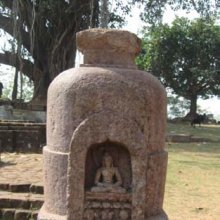Civ, Cīv: 7 definitions
Introduction:
Civ means something in Hinduism, Sanskrit. If you want to know the exact meaning, history, etymology or English translation of this term then check out the descriptions on this page. Add your comment or reference to a book if you want to contribute to this summary article.
Alternative spellings of this word include Chiv.
Images (photo gallery)
Languages of India and abroad
Sanskrit dictionary
Source: DDSA: The practical Sanskrit-English dictionaryCīv (चीव्).—I. 1. U. (cīvati-te)
1) To wear, cover.
2) To take or receive.
3) To seize. -II. 1 U. (cīvayati-te)
1) To shine.
2) To speak.
Source: Cologne Digital Sanskrit Dictionaries: Shabda-Sagara Sanskrit-English DictionaryCīv (चीव्).—[cīva] r. 10th cl. (cīvayati-te) 1. To shine. 2. To speak. (ṛ) cīvṛ r. 1st cl. (cīvati-te) 1. To take. 2. To wear. cu-ubha-saka-seṭ pakṣe bhvādi .
Source: Cologne Digital Sanskrit Dictionaries: Benfey Sanskrit-English DictionaryCīv (चीव्).—or cīb, or cīy, i. 1, [Parasmaipada.], [Ātmanepada.] 1. To take. 2. To cover. cīv, i. 10, [Parasmaipada.] To shine (or speak).
Source: Cologne Digital Sanskrit Dictionaries: Monier-Williams Sanskrit-English DictionaryCīv (चीव्):—(or cīb) [class] 1. vati, vate, to take, [Dhātupāṭha xxi, 15];
—to cover (derived [from] cīvara), [ib.] : [class] 10. cīvayati, [xxxiii, 101].
Source: Cologne Digital Sanskrit Dictionaries: Yates Sanskrit-English Dictionary1) Cīv (चीव्):—(ṛ) cīvati To take.
2) (ña, ṛ) cīvati, te 1. c. To take, to wear. 10th to shine; to speak.
[Sanskrit to German]
Sanskrit, also spelled संस्कृतम् (saṃskṛtam), is an ancient language of India commonly seen as the grandmother of the Indo-European language family (even English!). Closely allied with Prakrit and Pali, Sanskrit is more exhaustive in both grammar and terms and has the most extensive collection of literature in the world, greatly surpassing its sister-languages Greek and Latin.
See also (Relevant definitions)
Starts with (+386): Civa, Civa madu, Civa-cama-vatacaivam, Civa-cankiranta-vatacaivam, Civa-kanamutal, Civa-makapuranam, Civa-nanacittiyar, Civa-nanakocam, Civa-nanamunivar, Civa-neripirakacam, Civa-punniyatelivu, Civacampotanai, Civacan, Civacancivi, Civacariyar, Civacatakkiyam, Civacatanam, Civacatci, Civacatti, Civacci.
Full-text (+14): Ciy, Cib, Riv, Civi, Tapincha, Dayaluta, Trasakrit, Tikshnakara, Jathararoga, Civuka, Civvenal, Tanayabhavana, Koshtharoga, Kamukayita, Gocaraphala, Tuhinakiranaputra, Chandana, Dhatvakarakhya, Tamraka, Jatharagada.
Relevant text
Search found 14 books and stories containing Civ, Cīv; (plurals include: Civs, Cīvs). You can also click to the full overview containing English textual excerpts. Below are direct links for the most relevant articles:
Mahabharata (English) (by Kisari Mohan Ganguli)
Section CIV < [Tirtha-yatra Parva]
Section CIV < [Bhagavat-Yana Parva]
Section CIV < [Jayadratha-Vadha Parva]
Kashyapa Shilpa-shastra (study) (by K. Vidyuta)
1. About the Author Kāśyapa (Introduction) < [Chapter 2 - Author and his Works]
Apastamba Yajna-paribhasa-sutras (by Hermann Oldenberg)
Jain Remains of Ancient Bengal (by Shubha Majumder)
Geographical as well as Geo-political unit of Zone IV < [Chapter 2 - Geographical Setting of the Study Area]
Kathasaritsagara (the Ocean of Story) (by Somadeva)
Note on the magic string < [Notes]
Chapter LXX < [Book XII - Śaśāṅkavatī]
Chapter CIV < [Book XIII - Madirāvatī]
Yogadrstisamuccaya of Haribhadra Suri (Study) (by Riddhi J. Shah)
Chapter 2.3 - Date of Haribhadrasūri < [Chapter 2 - Life, Date and Works of Ācārya Haribhadrasūri]

